Resistance is Futile: Why We Love to Hate the Borg
Many critics have failed to acknowledge the enduring appeal - or should I say fear - of the Borg.
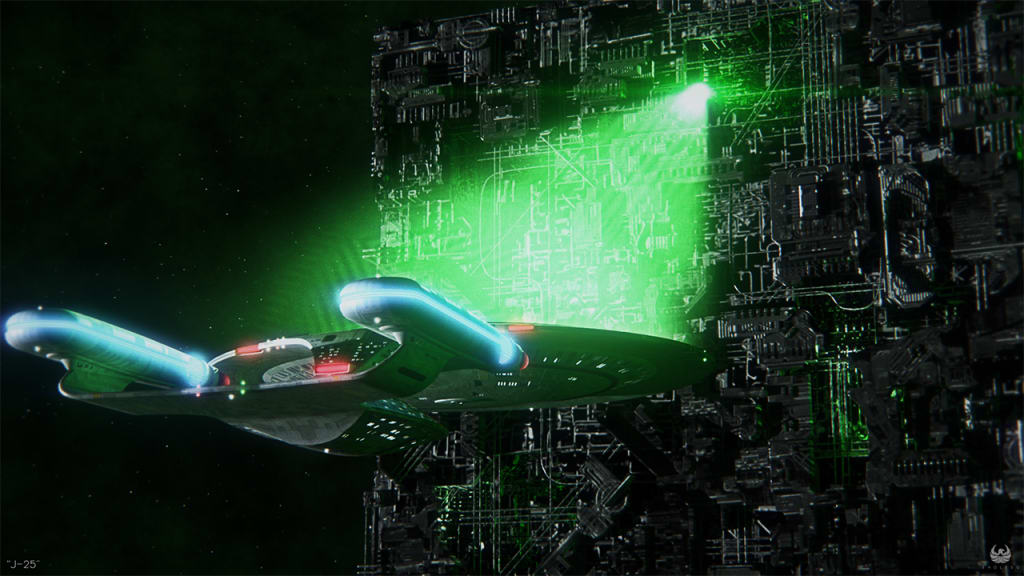
Recently, Netflix revealed the results of a survey on Star Trek episodes, which found that some of the most re-watched Trek episodes included, surprisingly, some from Star Trek: Voyager! This came as a shock to many apparently, because the continuing hatred towards Voyager is irrepressible. The Mary Sue couldn’t understand these results, while io9 was outright baffled by these findings. Noticeably the list doesn't include any episodes from The Original Series, Deep Space Nine or Enterprise – the exclusion of the former two has left the Star Trek critics community reeling.
Aside from my own feelings about Voyager, which I have made abundantly clear already, the overwhelming connection between the majority of the re-watched episodes is that they focus on the #Borg. Many critics have been too busy snarling at Voyager’s presence in the list to acknowledge the enduring appeal - or should I say fear - of the Borg.
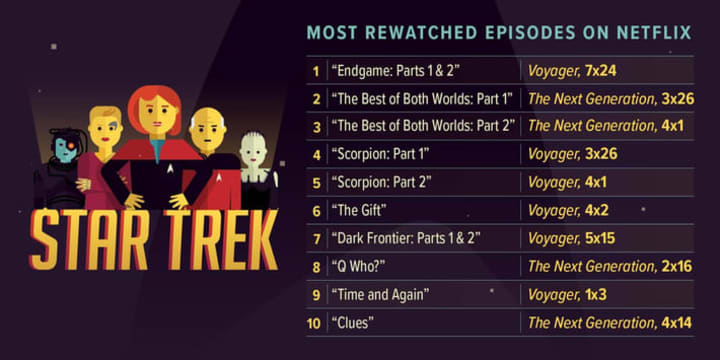
This graphic does give it away though [Credit: Netflix]
Ever since Q hurled the Enterprise-D into Borg space in Star Trek: The Next Generation’s ‘Q Who’ and gave the Borg a taste of human technology, these cyborgs have been on a mission to assimilate humanity, thankfully to little avail. In the Star Trek universe, humanity has somehow managed to overcome every attempt by the Borg to conquer the Alpha Quadrant. Trekkies are used to the heady mix of the indomitable human spirit and the power of friendship eclipsing these frightening creatures. It is perhaps for this reason precisely that the Borg episodes tend to be more intense, more epic and far more emotional.
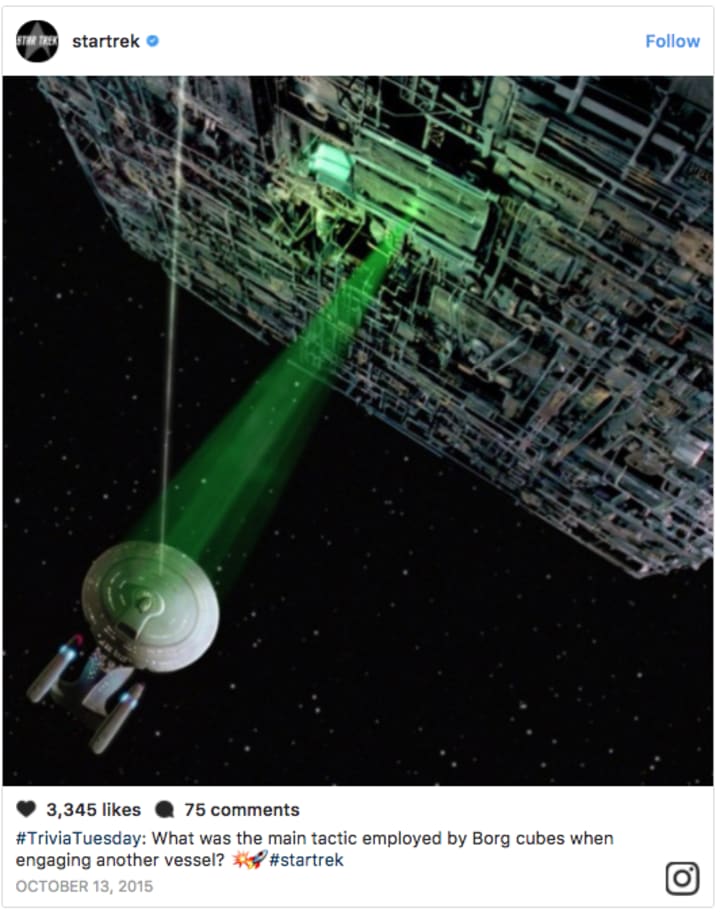
When Picard is assimilated into the Borg and becomes Locutus in ‘The Best of Both Worlds’, not only is his humanity at stake, it is more importantly his personality and the friendship he brings to his entire crew that Riker et. al. are unable to forego. While Starfleet readily gives Picard up for dead, the Enterprise crew still look for ways to save their Captain, at great personal risk. Because that is what TNG has always been about – the relationships between the crewmembers mean more than the rules. Actually, one could say that about all of Star Trek.
We as human beings prize our individuality above all else. We decry any culture that suggests we must conform physically or emotionally. Our greatest stories often investigate the loss of individuality and end with our heroes overthrowing the crushing dictatorship that quashes our uniqueness. Anarchy, it seems, is preferred over uniformity. It is no wonder then that the Borg continue to hold such sway over fans; they have vanquished the best of our favourite characters and instilled fear and dread in the Alpha Quadrant, only to be undone by the Quadrant’s greatest strength – that's humanity.
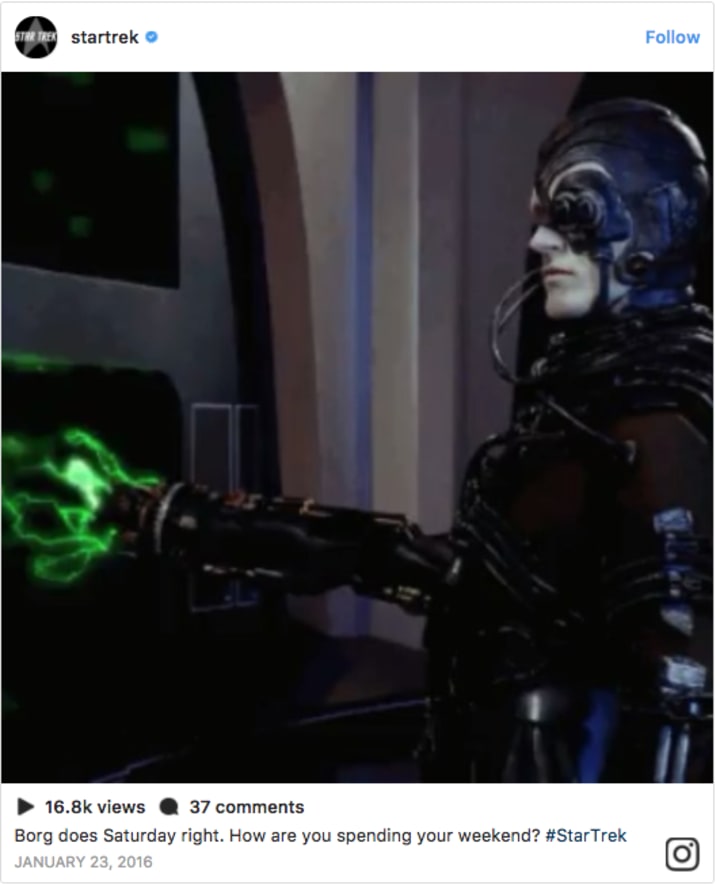
If we investigate our recent dystopian favourites, a similar theme runs through them all. In George Orwell’s 1984 and Aldous Huxley’s Brave New World our heroes are already entrenched in worlds that have foregone personal identity. In A Handmaid’s Tale, this year’s breakaway favourite on television and an enduring novel by Margaret Atwood written in the 80s, women are stripped of their identity to such an extent that they no longer even possess their own names. Even novels that do not focus entirely on the dystopian loss of individuality still endure due to them. One Flew Over the Cuckoo's Nest by Ken Kesey and the New Seoul storyline in David Mitchell’s Cloud Atlas have a similar theme of anarchy overpowering homogeny. Even the youngsters of today aren’t spared, as the majority of young adult series these days, from The Hunger Games to the Divergent series, imagine a world where people’s destinies are pre-determined into standardised segments. What then do the actions of an individual mean when they are but a part of a collective decision? The Locutus transformation, and the subsequent devastation at Wolf 359, specifically throws up this question – is Picard culpable for these losses, or can we just blame the Collective hive-mind? Captain Sisko attempts to get an answer to this in the pilot episode of DS9; unsurprisingly, there is none to give.
Voyager delves deeper into this subject, particularly with the character of Seven of Nine. A former Borg drone who was assimilated as a child, Seven’s views of humanity are as alien as the Borg are to humans. She struggles a great deal with hierarchies and interpersonal relationships and thus, has an extraordinary arc throughout the show.
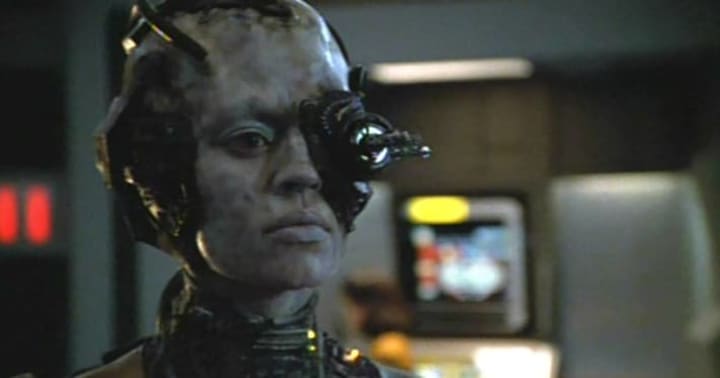
Seven of Nine [Credit: @StarTrek via Facebook]
From the moment the Borg enter the periphery of Voyager’s viewscreens, their journey through the Delta Quadrant becomes that much more arduous. Like a ghost perennially following in the shadows, the crew of Voyager must constantly be on their guard; you can feel the rising tension with each succeeding Borg episode. In the two-part ‘Scorpion’ episodes, Captain Janeway makes the difficult decision to ally herself with the Borg in a move to defeat the mysterious threat, Species 8472. We see a virtual role reversal from ‘The Best of Both Worlds’, with Voyager in the dominant position. But, where the former ended with a troubled but relieved Picard freed from the clutches of the Borg, here Janeway liberates Seven of Nine not for emotional reasons, but for the practical purpose of escape, leaving Seven an angry and alone individual unfamiliar with this new way of life.
In ‘Dark Frontier’, another Voyager two-parter, we see the inner workings of the Borg assimilation process and stand beside a guilty Seven reliving all the horrors she had perpetrated as a Borg. But, the question of belonging comes to the fore as Captain Janeway and the Borg Queen tussle for Seven’s loyalty. Janeway, much like Riker before, throws the rule book out the nearest airlock in her determination to get Seven back from the clutches of the Queen. While the subversive nature of this storyline warrants an article of its own, the winning formula is that kindness and friendship wins the day yet again.
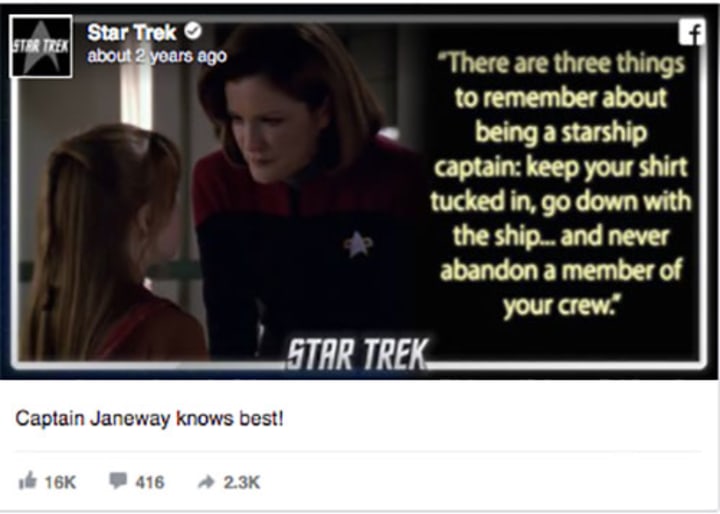
Seven proves to be a conduit for resolving many of the troubling questions the actions of Locutus brought up – including struggling with the accountability of one’s actions when in the Collective. The nature of the Borg recalls many uncomfortable instances of recent and ancient history, when choice was taken away and people were required to just ‘follow orders’. Seven’s arc over four seasons tackles these issues head on through her growth as a human being and her relationships with Voyager’s crew.
That brings us to ‘Endgame’, Netflix’s most re-watched Star Trek episode. As much as we would like to brush off the significance of Voyager’s finale, it is one imbued with plenty of heart and Borg terror. Yes, we all know how it ends – the title kind of gives it away – but at least the show goes out with a big bang. Of particular significance is that Voyager’s writers tied up a plot point (the destruction of the Borg) that would otherwise have been left hanging forever. ‘Endgame’ shows the Borg at their most brutal; buoyed by an arrogance formerly missing, which makes their demise bittersweet. But, as always, they provide the catalyst for some of Star Trek’s more emotional moments. These villainous beings are unintentionally adept at unifying their foes and the crew of Voyager is never closer than when up against a threat like these cyborgs. That is what makes the episodes featuring the Borg special, unity over adversity.
Just as Batman fans revel in a story about the chaotic Joker, the unmistakable charm of the Borg is that, in the 24th century, they are humanity’s greatest foe. They believe that assimilation leads to perfection, while our Federation starships know otherwise. It is no wonder then that Seven of Nine eventually comes to the conclusion that Voyager is her new collective.
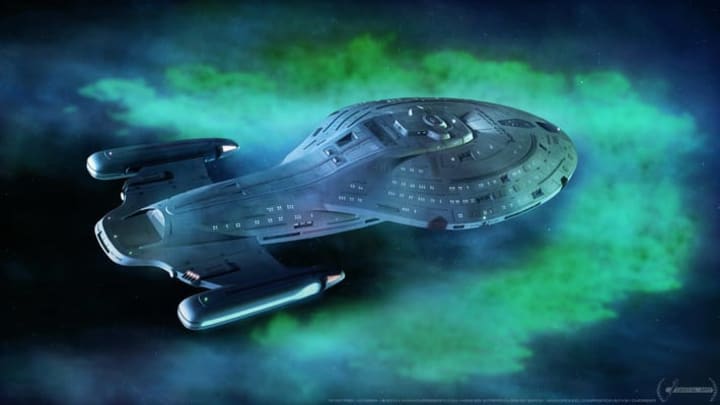
USS Voyager [Art Credit: Overseer]
Despite some outrage about the survey findings, it is no surprise then that so many Voyager episodes appeared on this list, considering the fact that the Borg play a pivotal role in the second half of the show. For a species that has only three iconic catchphrases, the Borg are exceptionally well fleshed out villains that mirror humanity’s greatest fears. Let's hope that Star Trek: Discovery can add some powerful new characters that ably reflect the world we live in. If that is not what science-fiction is about, then what is...
About the Creator
Monita Mohan
When not dreaming of a one-way trip to Coruscant, I'm usually staring at a blank page, hoping my articles write themselves.
Website: lightspeedwriter.wordpress.com
Twitter: @Monita_Mohan






Comments
There are no comments for this story
Be the first to respond and start the conversation.